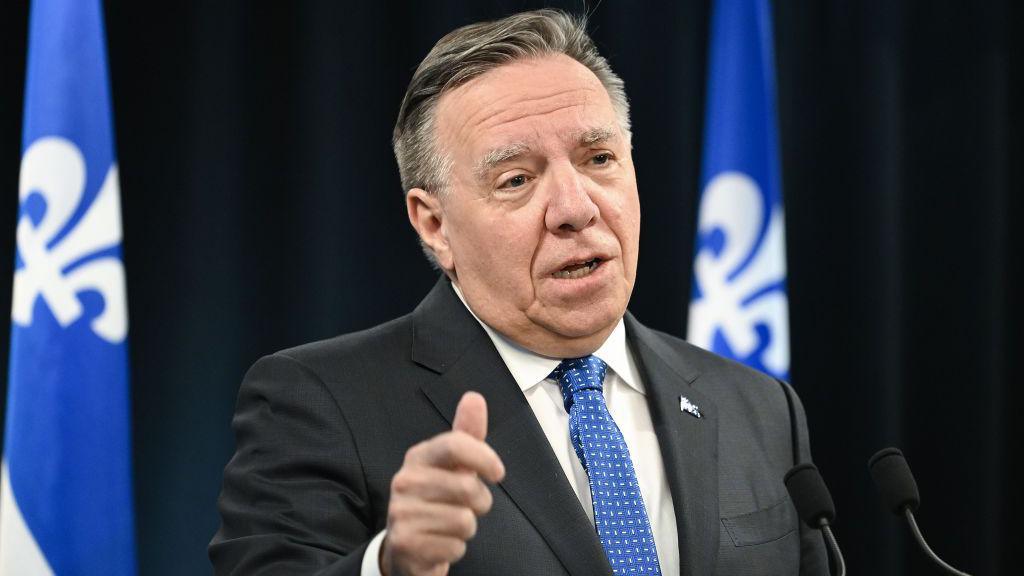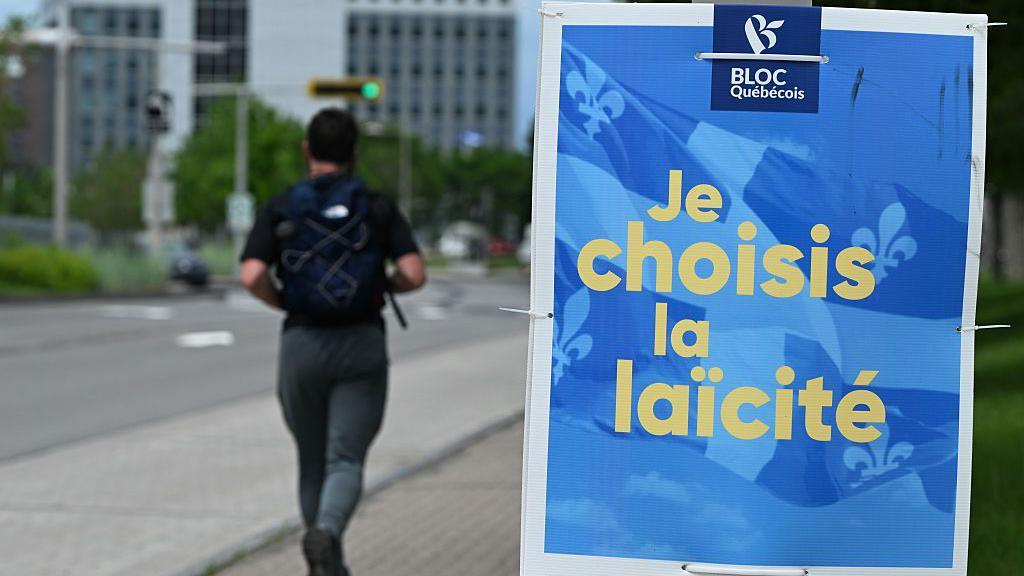Quebec expands secularism law and limits public prayer

Quebec Premier Francois Legault's government has passed a number of secularism laws in the Canadian province
- Published
The Canadian province of Quebec plans to impose restrictions on public prayer and limit the exclusive offering of religion-based menus, like kosher and halal meals, in public institutions as part of its latest effort to strengthen state secularism.
The "secularism 2.0" changes are part of a new bill introduced by the governing Coalition Avenir Quebec on Thursday, which expands a 2019 religious symbols law that has fuelled fierce debate throughout the country.
The original law prevents judges, police officers, teachers and public servants from wearing symbols such as the kippah, turban, or hijab while at work.
Canada's Supreme Court will hear a legal challenge of that law early next year.
Jean-François Roberge, the minister responsible for secularism, said in French at a news conference on Thursday that the bill was "part of an approach that respected individual as well as collective rights".
The measures proposed in Bill 9 would:
extend the ban on wearing religious symbols to staff in subsidised daycares
bar "collective religious practices" like prayer in public spaces like parks without prior authorisation from municipalities
prevent students and staff from wearing face coverings in daycare all the way through to post-secondary education
Roberge said the limits on public prayer were in reaction to recent protests in the province, where there has been debate over groups praying at pro-Palestinian demonstrations.
"It's shocking to see people blocking traffic, taking possession of the public space without a permit, without warning, and then turning our streets, our parks, our public squares into places of worship," he said.
The decision to strengthen the law has already faced criticism from the opposition Parti Québecois, which earlier this week accused the CAQ of creating division in an attempt to bolster support ahead of next year's provincial election.
The National Council of Canadian Muslims also criticised the bill, accusing the CAQ in a statement of "doubling down on identity politics and division in a desperate attempt to regain the public's trust".
Since Bill 21 was passed six years ago, the issue of secularism has continued to simmer in the province.
Last year, 11 teachers - primarily of North African descent - at a Montreal elementary school were suspended after government report said they had created a toxic environment for students and staff and largely avoided certain subjects like science and sex education.
Quebec Premier Francois Legault said the teachers had tried to introduce "Islamist" beliefs and vowed to strengthen secularism measures in schools.
In August, a government-mandated committee, external released a report with recommendations including a ban on religious symbols for daycare workers and the phasing out of public funding for private religious schools.
And last month, the Legault government passed a law that extended secularism rules to staff who interact with students in public primary and high schools and barring students from wearing face coverings.

A sign for the federal Bloc Québécois reads in French 'I choose secularism'
What is Quebec's secularism law?
Bill 21 prohibits public officials in positions of authority - like judges, police officers, teachers and public servants - from wearing symbols such as the kippah, turban, or hijab while at work.
It also requires public services to be provided and received with the face uncovered.
For Bill 21, the Quebec government invoked the "notwithstanding clause" - a part of the Canadian constitution that allows government to override "fundamental freedoms" of religion, expression, and association; the right to life, liberty and security of the person; and freedom from discrimination.
It essentially serves an opt-out option that prevents courts from striking down the legislation on constitutional grounds.
Bill 21 does not mention any specific religion and would include symbols worn by a person of any faith, including Christian, and affirms the religious neutrality of the state.
But critics argue it targets mostly religious minorities, and especially women of Muslim faith.
The law has faced a number of legal challenges in Quebec and Canada's Supreme Court has agreed to take up the case, which will hinge both on the law itself and the use of the notwithstanding clause.
The debate over secularism - broadly, the principle that religion and government institutions should be separate - has played a significant role in the province's public discourse for almost two decades.
Known in the majority French-speaking province as laïcité, it has been an important value in Quebec society since the 1960s as the Catholic Church's strong influence began to wane in the province.
A September survey by polling firm Leger, commissioned by media outlets Le Journal de Montréal and TVA, indicated that 68% of respondents thought secularism was an important value.
Similar legislation to Bill 21 is in place in various countries across the European Union.
France passed a ban on veils, crosses and other religious symbols in schools in 2004 and on face covering in public spaces in 2010.